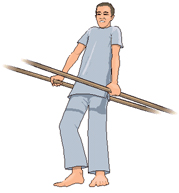Getting polio
This task is about adding words to a text so that it makes sense.

Source: School Journal Part I, 1983.
(Text altered)
The following piece of writing has some spaces where words are missing.
First, read the whole piece of writing through to get an idea of what it is about. Then fill each space with ONE word so that the whole piece of writing makes sense. You are able to change answers as you go.
When you have filled in all the spaces, re-read the text to check that the whole piece of writing makes sense.

